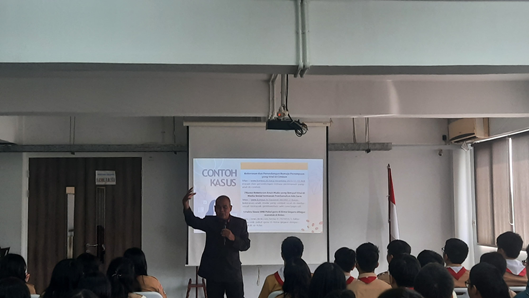IMPLEMENTASI AJARAN KASIH KRISTUS: PELATIHAN ALTRUISME UNTUK MEMBANGUN CARING BEHAVIOR REMAJA DI SMA SWASTA X JAKARTA
DOI:
https://doi.org/10.47457/jps.v5i2.503Keywords:
adolescents, altruism training, caring behaviorAbstract
The main problem of Generation Z is their indifference to the social environment, because they have been spoiled by advances in information and communication technology, so they have no concern for the interests of other people. This community service activity takes the form of altruism training which aims to develop caring behavior in generation z teenagers at X Private High School in Jakarta. The number of participants was 95 students (56 women and 49 men). The implementation method is carried out in pre-activity, activity and post-activity stages. Pre-activity issues were deepened through interviews with school principals, guidance and counseling teachers and lesson teachers. The activity period is providing altruism training. After the activity, namely interviewing the school principal, guidance and counseling teachers, lesson teachers and training participants. Data collection techniques through interviews, observation and documentation studies. Analysis technique with a qualitative approach. The results of the activity concluded that cognitively, altruism training can provide knowledge of helping behavior based on empathy for other people's conditions, so that they can develop caring behavior to show helping (prosocial) behavior towards other people.
Downloads
References
Akhtar, Hanif, Ratih Eka Pertiwi, and Muhammad Fath Mashuri. 2020. “Eksplorasi Motivasi Relawan: Sebuah Perspektif Indigenous Psychology.” Jurnal Psikologi Sosial 19, no. 3: 206–16. https://doi.org/10.7454/jps.2021.23.
Amalia, Rizky, and Indah Fajrotuz Zahro. 2022. “Bimbingan Kelompok Sosiodrama Untuk Meningkatkan Perilaku Prososial Siswa Kelas X OTKP SMKN Ngraho Bojonegoro.” Al-Ihath: Jurnal Bimbingan Dan Konseling Islam 2, no. 1: 58–71. https://doi.org/10.53915/jbki.v2i1.156.
Amendolair, Darlene. 2012. “Caring Behaviors and Job Satisfaction.” The Journal of Nursing Administration 42, no. 1: 34–39. https://doi.org/10.1097/NNA.0b013e31823c18af.
Anam, Agus Khoirul, and Andi Hayyun Abiddin. 2022. “The Role of Family Against Children’s Anxiety After Disaster of Kelud Eruptions.” Jurnal Keperawatan 13, no. 1: 53–58. https://doi.org/10.22219/jk.v13i1.15155.
Ariani, Tutu April, and Nur Aini. 2018. “Perilaku Caring Perawat Terhadap Kepuasan Pasien Rawat Inap Pada Pelayanan Keperawatan.” Jurnal Keperawatan 9, no. 1: 58–64. http://ejournal.umm.ac.id/index.php/keperawatan/issue/view.
Asih, Gusti Yuli, and Margaretha Maria Shinta Pratiwi. 2010. “Perilaku Prososial Ditinjau Dari Empati Dan Kematangan Emosi.” Jurnal Psikologi Pitutur 1, no. 1.
Aupia, Anatun, Ting-Ting Lee, Chieh-Yu Liu, Shu-Fang Vivienne Wu, and Mary Etta Mills. 2018. “Caring Behavior Perceived by Nurses, Patients and Nursing Students in Indonesia.” Journal of Professional Nursing 34, no. 4: 314–19. https://doi.org/https://doi.org/10.1016/j.profnurs.2017.11.013.
Hadori, Mohamat. 2014. “PERILAKU PROSOSIAL (PROSOCIAL BEHAVIOR); Telaah Konseptual Tentang Altruisme (Altruism) Dalam Perspektif Psikologi.” LISAN AL-HAL: Jurnal Pengembangan Pemikiran Dan Kebudayaan 8, no. 1: 7–18. https://www.journal.ibrahimy.ac.id/index.php/lisanalhal/article/view/71.
Hastini, Lasti, Rahmi Fahmi, and Hendra Lukito. 2020. “Apakah Pembelajaran Menggunakan Teknologi Dapat Meningkatkan Literasi Manusia Pada Generasi Z Di Indonesia?” Jurnal Manajemen Informatika (JAMIKA) 10, no. 1: 12–28. https://doi.org/10.34010/jamika.v10i1.2678.
Kau, Muhrima A. 2010. “Empati Dan Perilaku Prososial Pada Anak.” Jurnal Inovasi 7, no. 3: 1–5. http://ejurnal.ung.ac.id/index.php/JIN/article/download/771/714.
Miller, Richard M. 2008. “THE INFLUENCE OF TEACHERS’ CARING BEHAVIORS ON HIGH SCHOOL STUDENTS’ BEHAVIOR AND GRADES.” Seton Hall University.
Mulyawati, Yuli, Arita Marini, and Maratun Nafiah. 2022. “Pengaruh Empati Terhadap Perilaku Prososial Peserta Didik Sekolah Dasar.” Scholaria: Jurnal Pendidikan Dan Kebudayaan 12, no. 2 (May): 150–160. https://doi.org/10.24246/j.js.2022.v12.i2.p150-160.
Musi, Muhammad Akil, Sitti Nurhidayah Ilyas, and Gabrien Bunduk. 2019. “Pengaruh Kegiatan Outbound Role Play Terhadap Perilaku Prososial Anak Usia Dini.” Jurnal Golden Age, Universitas Hamzanwadi 44, no. 12: 2–8.
Pai, Hsiang-Chu, Cheng-Joo Eng, and Hui-Ling Ko. 2013. “Effect of Caring Behavior on Disposition Toward Critical Thinking of Nursing Students.” Journal of Professional Nursing 29, no. 6: 423–29. https://doi.org/https://doi.org/10.1016/j.profnurs.2012.05.006.
Piliavin, Jane Allyn, and Hong-Wen Charng. 1990. “Altruism: A Review of Recent Theory and Research.” Annual Review of Sociology 16, no. 1990 (August): 27–65. http://www.jstor.org/stable/2083262.
Pujiono, Andrias. 2021. “Media Sosial Sebagai Media Pembelajaran Bagi Generasi Z.” Didache: Journal of Christian Education 2, no. 1: 1–19. https://doi.org/10.46445/djce.v2i1.396.
Rismi, Ridho, Neviyarni Suhaili, Marjohan Marjohan, Afdal Afdal, and Ifdil Ifdil. 2022. “Bimbingan Kelompok Dalam Pemahaman Nilai Empati Untuk Meningkatkan Sikap Prososial Siswa.” Jurnal EDUCATIO: Jurnal Pendidikan Indonesia 8, no. 1: 14. https://doi.org/10.29210/1202221496.
Sondang, Aprilia, and Suryo Ediono. 2023. “PENGEMBANGAN PENELITIAN TERHADAP TINGKAH LAKU ALTRUISME PROSOSIAL.”
Takwin, Bagus. 2021. “Catatan Editor: Mengembangkan Penelitian Tentang Tingkah Laku Prososial Dan Altruisme.” Jurnal Psikologi Sosial 19, no. 1: 3–6. https://doi.org/10.7454/jps.2021.02.
Zis, Sirajul Fuad, Nursyirwan Effendi, and Elva Ronaning Roem. 2021. “Perubahan Perilaku Komunikasi Generasi Milenial Dan Generasi Z Di Era Digital.” Satwika : Kajian Ilmu Budaya Dan Perubahan Sosial 5, no. 1: 69–87. https://doi.org/10.22219/satwika.v5i1.15550.

Downloads
Published
How to Cite
Issue
Section
License
Copyright (c) 2024 Jurnal PKM Setiadharma

This work is licensed under a Creative Commons Attribution-ShareAlike 4.0 International License.
Authors who publish with this journal agree to the following terms:
- Authors retain copyright and grant the journal right of first publication with the work simultaneously licensed under a Creative Commons Attribution License that allows others to share the work with an acknowledgement of the work's authorship and initial publication in this journal.
- Authors are able to enter into separate, additional contractual arrangements for the non-exclusive distribution of the journal's published version of the work (e.g., post it to an institutional repository or publish it in a book), with an acknowledgement of its initial publication in this journal.
- Authors are permitted and encouraged to post their work online (e.g., in institutional repositories or on their website) prior to and during the submission process, as it can lead to productive exchanges, as well as earlier and greater citation of published work (See The Effect of Open Access).











